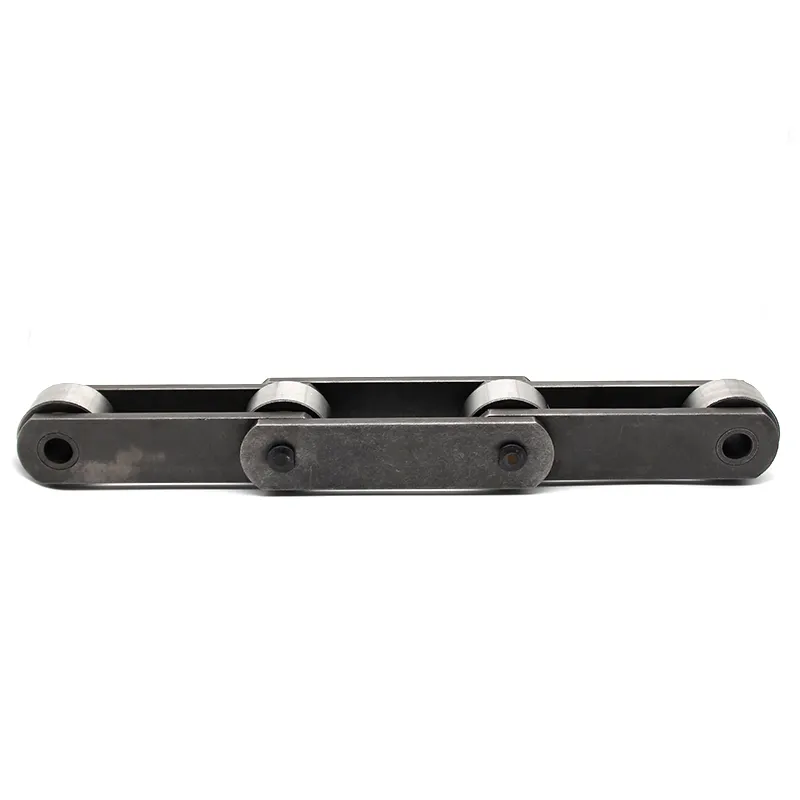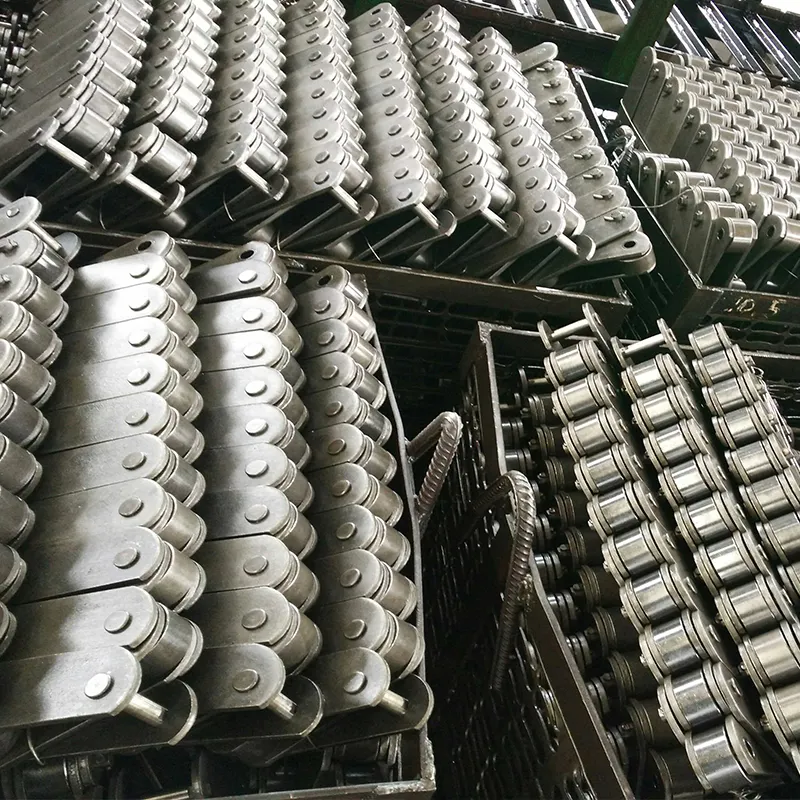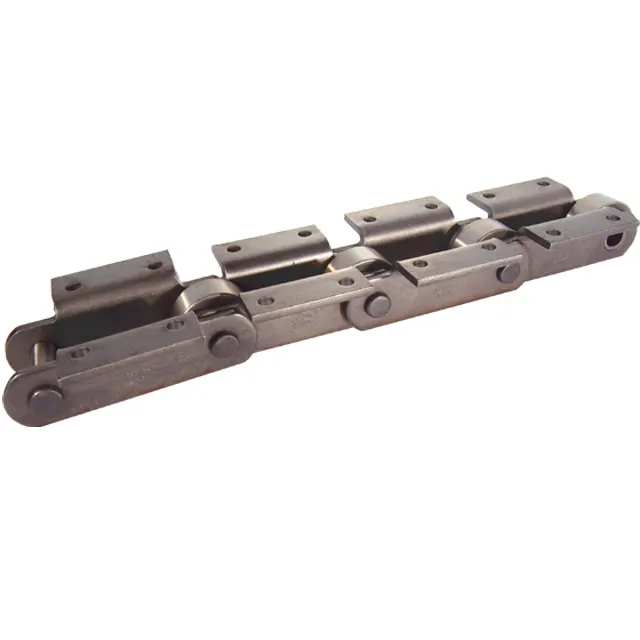Product Description
Product Description
Product Parameters
| Standard | GB, ISO, ANSI, DIN |
| Type | Standard A and standard B precision roller chain, conveyor chain; |
| special chain with accessories, welding chain, leaf chain and sprocket | |
| ANSI chain No. | 40,50,60,80,100,120,140,160,180,200,240; |
| C40,C50,C60,C80,C100,C120,C140,C160; | |
| DIN/ISO chain No. | 08A,10A,12A,16A,20A,24A,28A,32A,36A,40A,48A; |
| C08A,C10A,C12A,C16A,C20A,C24A,C28A,C32A; | |
| Application | Food processing, pharmaceutical and chemical industries, electronics, machinery; |
| household appliances, automotive manufacturing, metallurgy, sewage treatment | |
| Series | A series,B series |
More Products
Advantage
Certifications
DETAILS ABOUT CHINAMFG CHAIN
Exhibition
Workshop
Application
Packaging Details
Shipping
FAQ
1. Are you a manufacturer or trade Company?
We are a factory founded in 1997 with a trade team for international service.
2. What terms of payment do you usually use?
T/T 30% deposit and 70% against document, Western Union, L/C at sight
3. What is your lead time for your goods?
Normally 35 days after confirmed order. 30 days could be available in the low season for some items (during May to July), and 45 days during the new year and hot season ( Jan to March).
4. Samples
For customers who need sample confirmation before ordering, please bear in mind that the following policy will be adopted:
1) All samples are free of charge with a maximum value not exceeding USD 100.
2) The courier cost for the first-time sample sending will be charged by the consignee. We will send the samples with freight to be collected. So please inform your account with FedEx, UPS, DHL, or TNT so that we can proceed promptly.
3) The first-time courier cost will be totally deducted from the contract value of the trial cooperation.
4) OEM/ODM are both available.
| Standard or Nonstandard: | Nonstandard |
|---|---|
| Application: | Textile Machinery, Garment Machinery, Conveyer Equipment, Packaging Machinery, Electric Cars, Motorcycle, Food Machinery, Marine, Mining Equipment, Agricultural Machinery, Car |
| Surface Treatment: | Polishing |
| Structure: | Roller Chain |
| Material: | Stainless Steel |
| Type: | Double Pitch Chain |
| Samples: |
US$ 0/Meter
1 Meter(Min.Order) | |
|---|
| Customization: |
Available
| Customized Request |
|---|

What are the environmental considerations when using mill chains?
When using mill chains in industrial applications, several environmental considerations should be taken into account. These factors are important for sustainable and eco-friendly operations. Here are the key environmental considerations:
1. Lubrication: Proper lubrication of mill chains is essential for reducing friction and wear, which can lead to chain failure and increased energy consumption. Using environmentally friendly lubricants can minimize the impact on the environment.
2. Noise and Vibration: Excessive noise and vibration from chains can negatively impact the surrounding environment and workers’ well-being. Choosing chains with low noise and vibration characteristics can help maintain a more pleasant and safe working environment.
3. Material Selection: Opting for chains made from materials with low environmental impact, such as recycled or sustainable materials, can contribute to eco-friendliness.
4. Chain Recycling and Disposal: Implementing proper chain recycling and disposal practices ensures that end-of-life chains are managed in an environmentally responsible manner.
5. Chain Maintenance: Regular maintenance of mill chains is crucial to prevent premature wear and reduce the likelihood of environmental contamination from chain breakages.
6. Energy Efficiency: Selecting energy-efficient chain designs and maintaining proper tension can lead to reduced energy consumption and lower greenhouse gas emissions.
7. Preventing Chain Contamination: Keeping chains clean and free from debris can prevent potential environmental pollution when used in applications handling sensitive materials.
8. Compliance with Regulations: Adhering to environmental regulations and standards is essential to minimize the impact of chain usage on the environment.
9. Environmental Certification: Some chain manufacturers offer products with environmental certifications or comply with international standards for sustainability, providing assurance of eco-friendly practices.
10. Application-Specific Considerations: Different industries and applications may have unique environmental challenges. Considering these specific factors when selecting and using mill chains is vital.
By taking these environmental considerations into account, industries can work towards reducing their ecological footprint and contributing to more sustainable practices in their chain usage.

Can mill chains be used in the energy and power generation sector?
Yes, mill chains can be used in the energy and power generation sector for various applications. They play a crucial role in material handling and conveying processes, supporting the efficient operation of power plants and other energy facilities. Here’s how mill chains are utilized in this sector:
- Coal Handling: In coal-fired power plants, mill chains are commonly used in the coal handling system. They transport coal from storage yards or silos to the coal crushers, and then to the boiler for combustion.
- Biomass Handling: For power plants that use biomass as a renewable energy source, mill chains are employed to handle biomass materials such as wood chips, sawdust, and agricultural residues.
- Fly Ash and Bottom Ash Handling: Mill chains are used to transport fly ash and bottom ash, which are byproducts of coal combustion in power plants. They are conveyed to ash ponds or ash disposal systems for proper management.
- Waste-to-Energy Plants: Mill chains are used in waste-to-energy plants to handle and transport municipal solid waste for energy recovery processes.
- Nuclear Power Plants: Mill chains can be used in nuclear power plants for material handling applications, such as transporting fuel rods or other components within the facility.
- Hydropower Plants: Mill chains may be employed in hydropower plants for material handling during maintenance, construction, or repair activities.
- Wind Energy: In some wind energy projects, mill chains are used for the handling and conveying of materials during the construction and maintenance of wind turbines.
Mill chains are selected based on the specific requirements of each application, taking into account factors such as material type, temperature, corrosion resistance, and load capacity. Proper chain selection ensures reliable and efficient material transfer in the energy and power generation sector, contributing to the smooth operation of power plants and sustainable energy production.

What are the common industries that utilize mill chains for material handling?
Mill chains find extensive use in various industries for material handling applications due to their durability, strength, and versatility. Some of the common industries that utilize mill chains include:
1. Steel Mills: Mill chains are extensively used in steel mills for handling raw materials, such as iron ore, coal, and limestone. They are also employed in conveying hot and heavy steel products through various stages of the manufacturing process.
2. Cement Plants: In cement manufacturing, mill chains are used for transporting and handling raw materials like limestone, gypsum, and clinker. They are also used in the movement of finished cement products.
3. Paper and Pulp Industry: Mill chains play a vital role in the paper and pulp industry by conveying wood chips, paper rolls, and other raw materials throughout the production process.
4. Mining: In the mining industry, mill chains are used for the extraction and transportation of minerals and ores. They can handle heavy loads and harsh operating conditions commonly encountered in mining operations.
5. Automotive: Mill chains are employed in the automotive industry for handling various components and materials during manufacturing and assembly processes.
6. Agriculture: Mill chains are used in the agricultural sector for conveying grains, seeds, and other agricultural products in storage facilities, grain elevators, and processing plants.
7. Recycling: In recycling plants, mill chains are used to move and separate recyclable materials, such as metal scrap, paper, and plastics.
8. Foundries: Foundries utilize mill chains for the handling and transportation of molten metal and sand molds in the casting process.
9. Food Processing: The food processing industry relies on mill chains for handling and conveying food products during various stages of processing and packaging.
10. Construction: Mill chains are used in construction applications for transporting construction materials like sand, gravel, and concrete blocks on construction sites.
These industries and many others benefit from the reliable performance and robustness of mill chains in their material handling operations, ensuring efficient and smooth movement of materials throughout their processes.


editor by CX 2023-11-20